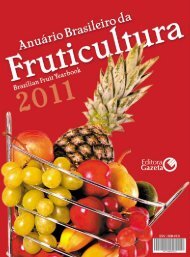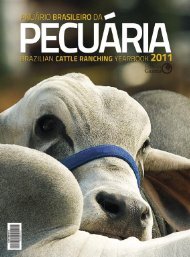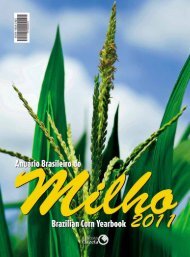tradicionalmenteinovador - Brazil Buyers & Sellers
tradicionalmenteinovador - Brazil Buyers & Sellers
tradicionalmenteinovador - Brazil Buyers & Sellers
You also want an ePaper? Increase the reach of your titles
YUMPU automatically turns print PDFs into web optimized ePapers that Google loves.
Worth its weight in gold<br />
>> Spices are an indispensable ingredient in global<br />
culinary concepts, and they even changed the<br />
course of history and still enjoy great popularity<br />
Nowadays, there is no way imagining the preparation<br />
of a delicious dish without using spices or condiments, substances<br />
that impart peculiar flavor and aroma to recipes.<br />
Cooking is a real alchemy and spices are an integral part of<br />
the magic ritual and come in as indispensable ingredients,<br />
which had to go a long way until they reached popularity.<br />
The search for these products literally changed the history<br />
of humanity.<br />
Up to the Middle-Ages, spices were found only in the<br />
East. In the European Empires, salt was the only ingredient<br />
available for preserving food. Monarchs used to organize<br />
expeditions in search of these spices, which used to arrive<br />
in western countries worth their weight in gold. Some cities,<br />
like Genoa and Venice in Italy, made a lot of money from this<br />
trade, which was carried out through land routes which required<br />
many traveling days.<br />
Years later, one small country entered into history as the<br />
protagonist of the biggest deed on record in search of these<br />
eastern spices. In 1497, King D. Manuel I, of Portugal, entrusted<br />
navigator Vasco da Gama with an important mission. With<br />
just three vessels, he left Lisbon and ended up discovering the<br />
maritime route to India, surrounding the African Coast. This<br />
adventure made Portugal consolidate its maritime presence<br />
and the domain over the commercial routes. From then onwards,<br />
the meals in Europe turned more aromatic.<br />
>> VALUE Although being indispensable, spices are<br />
not consumed in great amounts. The fact is, a tiny portion is<br />
enough to impart flavor and taste to all kinds of food. Agro-<br />
nomic engineer Célio Kursel do Sacramento, professor at the<br />
State University of Santa Cruz (Uesc), in Ilhéus (BA), keeps a<br />
collection of studies on these products. He explains that, as<br />
spices are popular all over the world, the market is vast but<br />
stabilized. In <strong>Brazil</strong>, he says, almost all spices are produced.<br />
“The clove is cultivated only in Bahia, which is also the only<br />
area in the West that grows commercial crops of this spice”, he<br />
observes. All other spices are grown throughout the Country.<br />
Black pepper is produced in huge areas in Pará, Espírito Santo<br />
and Bahia. Garden pepper producers include the states of<br />
São Paulo, Minas Gerais, Bahia, Rio de Janeiro, Espírito Santo<br />
and Ceará. Allspices, cardamom and nutmegs are common<br />
in Bahia, while vanilla is produced in Bahia and Pará. Ginger<br />
is found in Santa Catarina, Paraná, São Paulo, Rio de Janeiro,<br />
Espírito Santo and some states in the Northeast.<br />
According to Sacramento, spices are cultivated in small<br />
areas, which range from 0.5 to 100 hectares. Some spices<br />
are highly valued. He recalls that vanilla fetches up to US$<br />
300 per kilo in processed capsules and cardamom, in the<br />
national market, could fetch R$ 600 per kilo. “<strong>Brazil</strong> suffers<br />
huge competition from other countries, like Indonesia, India<br />
and Malaysia. Cheap labor in these countries result into imports<br />
at very low prices”, he observes.<br />
>> MENU . Menu<br />
As principais especiarias são:<br />
The main spices are:<br />
*Pimenta-do-reino . Black Pepper<br />
*Cravo-da-índia . Clove<br />
*Canela . Cinnamon<br />
*Cardamomo . Cardamom<br />
*Pimenta-da-jamaica . Allspices<br />
*Noz-moscada . Nutmeg<br />
*Baunilha . Vanilla<br />
*Pimenta hortícula . Garden pepper<br />
*Gengibre . Ginger<br />
*Açafrão . Saffron<br />
Fonte: Engenheiro agrônomo Célio Kersul do Sacramento (Uesc)<br />
Source: Agronomic Engineer Célio Kersul do Sacramento (Uesc)<br />
31





